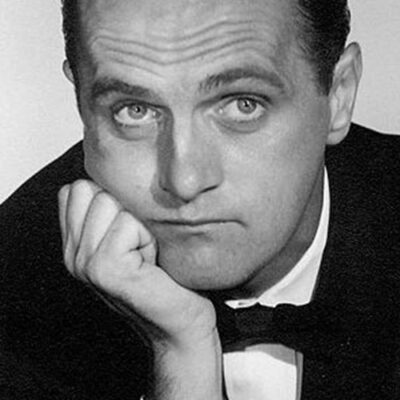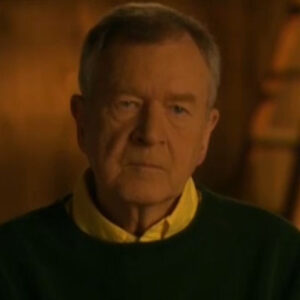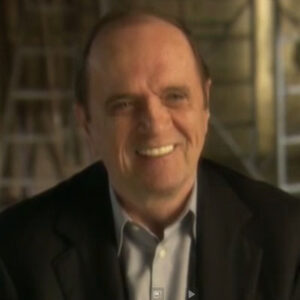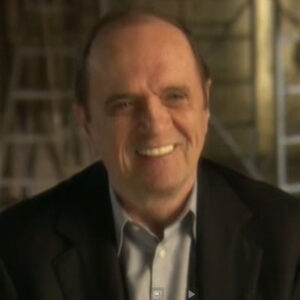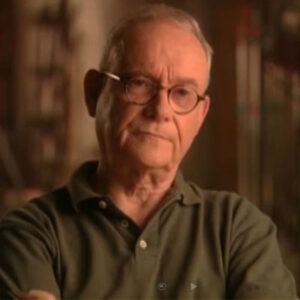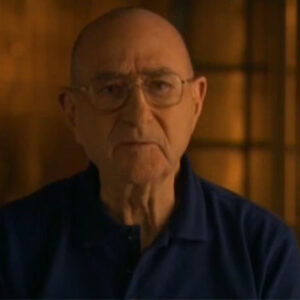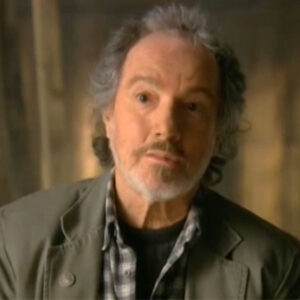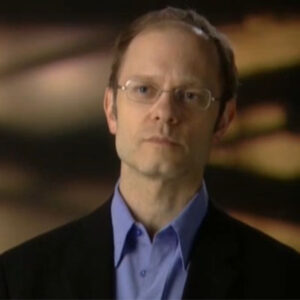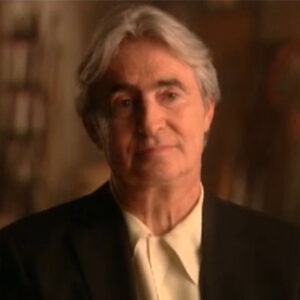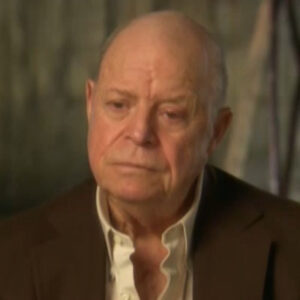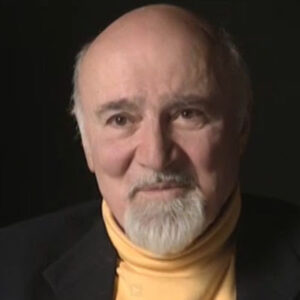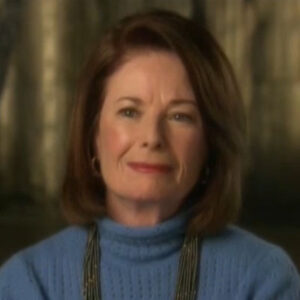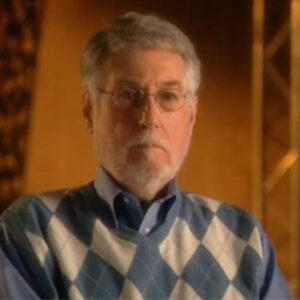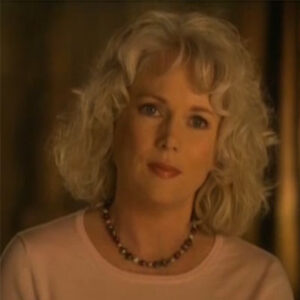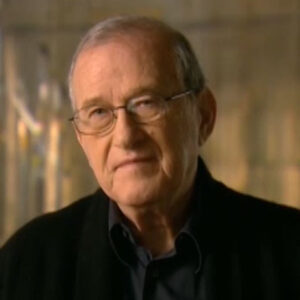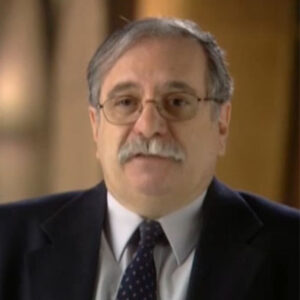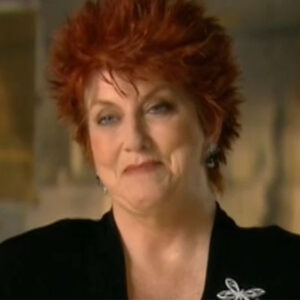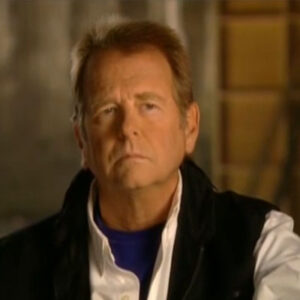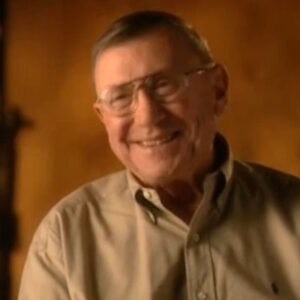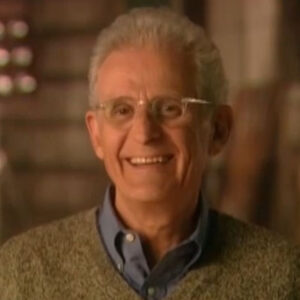Interviewer: I just wonder if you could tell me I know a lot about comedy history and if you could tell me. I’ll talk a little bit about what comedy was like in the early 50s before Bob came along. It was a different type of comedy.
Dick Martin: Yes, actually, Bob followed us. Why? I know. Maybe five years. So he really missed the great. My favorite of my three careers was nightclubs. I just loved going out and saying good evening and I’m having a ball at those disappeared. People don’t understand that a comedy club is now a nightclub. And he missed the Copacabana in New York. They shape Larry in Chicago, all of those. That was that was pretty much gone by the time he got there. And then something supplanted them that made it impossible financially to go there because they had these places, like in New York instead of the Copa, you would play Westbury, Long Island. And that seated 4000 people as opposed to 600. And so you made more money.
Interviewer: Was the humor itself also different? Was it more even before, you know.
Dick Martin: There were joke tellers? We were never joke tellers. Bob was never a joke teller persay. They joke tellers were all the way from top nose. Henny Youngman on up to Milton Really? Berle was not a joke teller, per say. He was more of a. All around entertainer, I know comedy changed. Not for the better. Incidentally, it changed. There was a lot is a say kinder, gentler, more fun in those days. Today, it’s rather harsh. And I don’t know if there is not much fun. I can’t find any thing on television comedy wise to watch. If it doesn’t have a leppard’s in it, I don’t watch the animal kingdom. There’s nothing there. Yeah, there’s nothing.
Interviewer: What do you think about what was happening right at the time? And then Bob came along. Was there a sea change happening with comedy? It was towards storytellers.
Dick Martin: Well, what we were doing was an extension of vaudeville. And we I never got to really show of vaudeville when I was a kid. My my uncle would take me. But. That was segmented you and there would be a comedian for 12 minutes and then there’d be a dancer and someone did. Whoops. It was. But the comedy itself. Changed. From the ones that I grew up with, the Ben Jack Benny’s and the George Burns and Gracie. And it changed from that to. Lenny Bruce and a few others who, incidentally, was not a dirty comedian. He just opened things up. He dirty comedians. Now, I’ll tell you, they came along. Oh, boy. But that that wasn’t his humor. His humor was just talking about things that hadn’t been talked about before.
Interviewer: And how did Bob fit into that, because he was right in that.
Dick Martin: I think Bob is maybe one of the. And I said there said at a writers meeting one time at The Newhart Show, Martha Newhart, The Bob Newhart Show, I said, you did you know anyone that could. To. About 15 premises and put different, totally different. And what a modern album. And, you know. Bob did. Bob came up with these premises. You have to come up with the driving instructor. Now, there’s nothing unusual about a guy, but the way Bob did it was just, you know, and the way the submarine commander. That’s outrageous. And I had a very lucky thing because they finally we finally they put it his album, the first one button down on film. And we shot it. I directed it. And it was hit the Raymond Theater in Pasadena. And it’s just marvelous. And how those things work visually and without all of the trappings, we’d have a chair and a table or something. You’re hang like me. And it was a submarine commander and a bob was good at premises. And that’s that’s important.
Interviewer: Is that stands apart from what is what is.
Dick Martin: Oh, yes. Wow. Number one, you would not. Like, my first directing job was on The Bob Newhart Show. And I was. Dan had retired. It was 1976, and Bob and his manager both said wanted to direct one of the Bob Newhart Show. Well, I don’t know how to direct you, frankly, to sit up there and watch. It’s which you do anyway. I sat up there and sitting next to me was a number one observing. That was Jimmy Burrows, who became the king of all television directors. And we both watched it. And in five weeks, the executive producer, Mike Zinberg said, you’re on. You’re doing the next one. I went, Oh, dear. And I took to it like I. I’d been doing it all my life. I just loved directing. And they they that’s where you get to see you, where they see a way where he can direct. Bob Newhart. I said, No. One, you don’t fool around with his. Delivery. Don’t ever stick your finger in there because he knows what he’s doing. And a couple of the longer speeches. Only thing where I remember the kitchen. Remember the kitchen set from The Bob Newhart Show? Well, right there, there was a counter and I had a big box of corn or whatever kind of cereal. And on the back of it, I put his lines and he was on the phone back there. So he’s left them right at the cornflakes and. But those are the only things that he needed that kind of prompting because his timing is one of hesitance. Or, as Rickles says, the stammering idiot. But he did it, that’s the way he times things. Any times things by listening to that’s why he was so good on the phone. He listens and then responds. So he was a delight to direct.
Interviewer: You mentioned the telephone and I’m thinking particularly for Abe Lincoln. He says that he’s probably most proud.
Dick Martin: I think I think that is if you stop to think about it. It’s just outrageous that some press agent is telling the president, United States. Well, you wrote it on a walk, the back of a wall. Oh, that’s brilliant. And and then all other things that Lincoln did. You could talk about it a few years ago. No, no, no. Four score. That gives you. No. I think that’s brilliant.
Interviewer: What about his albums? What impact did they on the comedy?
Dick Martin: Well, you know, it was a very strange period that didn’t last very long. That’s where comedy albums were a source of amusement for the home because the television was not did not have that big a grip. Radio was marvelous, but it had been around. So people kid younger people would take the vaun meter. Bob Newhart and Bill Cosby all. And they would. That was there at entertainment. They’d sit down, have a few drinks and listen to the album. That was very, very big. It was amazing how the biggest and. Briefly with one meter, who did the JFK? And it was so big. And then I saw him in a club. Years later, not years later, even Lapsley, a little while later. And he was not a funny man. But in that arena. He was he was brilliant. But take him out of that. See, that’s where Newhart Newhart did his album the first time he appeared. And we were I was there. That place called Freddie’s in Minneapolis. That was his first job. Other than when he recorded it at the Tidelands in Houston. But he would recite the act. He would just recite the. And. And then he then gradually loosened and became a marvelous monologist. Talk about anything.
Interviewer: You saw him kind of learning.
Dick Martin: Oh, yes. Oh, yes. He. He learned. He knew. He knew. He was funny. But then, you know, he didn’t deviate. You know, he just did whatever he wrote and now he can stand up there and. Where are you from? Do you anything? Because he now is got the confidence.
Interviewer: He started out really as a great comedy writer.
Dick Martin: Oh, yes. And most people do. George Carlin was a writer. Cause was a writer. Cosby was a writer for themselves. And that’s what Bob was a writer for himself. And then. And then you just roll. And he then they they all just blossomed. Shelley Berman, they all just blossomed. But he lasted longer. Because he’s welcome in the home. It’s it’s it’s. It’s sad, but some comedians are not really welcome in the home. People will go out and laugh at them in a nightclub. See them in a movie and laugh at them. But they don’t particularly want them in their home. And that’s why they love Lucy. Because she was welcome in their home. And Bob is the most welcome. Because he doesn’t bother anybody, comes in, may amuse a Jew and any any easier. He’s wonderful that way.
Interviewer: Do you think so? I can see also I mean, he did have some targets as far as his humor. He wasn’t like Lenny Bruce ranting. But do you think he was able to maybe get away with saying things because of the way he said it?
Dick Martin: Oh, yes. You can say almost anything if you’re hesitant about it. And he did kind of skirt around it, but he did some marvelously daring things. I think.
Interviewer: What can you think of an example?
Dick Martin: My my catalog, mine. Is not functioning because I’m trying to think of a submarine commander.
Interviewer: King Kong.
Dick Martin: King Kong was.I don’t know, one thing he never touched particularly was family. And Sex. You don’t find much reference to sex in Bob’s act or in his in his past. Whereas other comedians. Well, Mike, myself, Dan and I, our big thing was I was always looking. And he was trying to hold me back. Cosby was family talk, mostly family Bob, as I say, had these outrageous premises and would and would do them and into be right that boil. Oh boy. Imagine we tried to hire George Carlin. Tried to Harry. But it was too late. It was too late. But what a marvelous thing. If you could have hired a Bob Newhart as. As one of your writers or a lot of Causby. My God is another great premise, man.
Interviewer: Do you think people see that he comes across as just so you know, the every man so personable and all those things, but to come up with these outrageous premises, you know, and so. Well, is there more going on in there?
Dick Martin: Oh, yeah. Oh, yeah. Yeah, he is Machiavellian. He was a little naughty. And I remember once a friend of ours. Named Hal March. I don’t know if you remember him. He was I hate to put him in a category of he did the sixty four thousand dollar question or something. It was just a quiz show. But before that, he was a sweetie in March. Anyway, he was not doing well physically. And Bob called one day and he said, Dick, I’m I’m I’m I’m redoing my phone book. And now I’m on the AM. Was giving going to make it upset. Who’s got the nerve to say that? Now, he would never say that in public or in his act. But that’s the way he thinks.
Interviewer: Do you think it was a for him to stay clean and say, oh, yes.
Dick Martin: Oh, he knew what he was doing? Yes. Well, it wasn’t the it’s the way Bob thinks anyway, but the little. It’s me and it’s there.
Interviewer: Was talking about how the albums change things. Do you think Bob’s albums helped basically bring comedy to a younger audience?
Dick Martin: Well, yes. Yes. They all did, because. No, nobody. I don’t remember any. This was never around when I was a kid. There were no albums. There was no one. Am I talking about there? There. There was Karbasi, maybe. No, that was later.
Interviewer: That was more older people going to clubs.
Dick Martin: You go to clubs or vulnerable, as I say. Balboa’s, you got to remember, that was the night club of its day. And that’s where you would see her, Jack Benny’s and Henny Youngman and Milton Berle and all the great people that came along and made it very big visually. Red Skelton, amazingly visual comedian. And now Bob is not particularly a visual comedian. But he gets these weird pictures going and get you involved in these and talking to Abe Lincoln. That’s funny.
Interviewer: And yet you seem to work so well on television. So.
Dick Martin: Yes, well, he pretty much plays Bob. Now, we have I’ve been through the Bob Newhart Show and the Newhart show. And then Bob. And then we had George and Leale. So he’s still he’s a good actor. That’s probably why he’s so good at the comedy that he does on television. He’s very good actor.
Interviewer: Is that separate from his stand up, separate, do you think he was acting in that as well?
Dick Martin: He was acting in that. Oh, yeah. You’re always acting your. That’s not really. He’s observing in his standup. And it’s like most guys are really saying. Did you ever wonder why? And then they talk about whatever and and they’re observing life. And he had a different slant. That was marvelously refreshing.
Interviewer: Did you see his 1961 variety show and can you talk about what he thought about that?
Dick Martin: Yeah, it was, yeah, it was. It was Catarina, the lengthy and it was it was it was very good, but it didn’t I don’t think it had a good blend because Bob would do this and then he’d present this act and that would work if you did a whole vlog act like Ed Sullivan. I mean, you know, he wasn’t gonna do anything and and he established that. But I thought it would. I thought it was a boy. I’d I’d watch it. I just think if you’re looking at someone, you’re like. Me personally, but I mean, some performer that you like. It’s. That’s why they’re there. There’s a show out now called Inside the Actors Studio. And Jimmy Lipton. And it’s a fun show because you get to see what these people are like. And Ed, talk about about themselves and their beginnings. Bob had a radio beginning, I guess. Yeah. Back in Chicago. And that, again, is very visual, medium radio. You have to create a picture. And he was good at that. Yeah, I’d love to have a copy of that. He did an ad with another guy and I wonder if anything exists right now, are you? That would be fun.
Interviewer: So talk about your ship laughing. And what was going on in TV at the time and that was pretty pushing the envelope. Yes.
Dick Martin: Well, yes. Comedy. At anything, any kind of drama or comedy as a way of getting complacent, a falling into a pattern. And it was a very good pattern for a while. They had marvelously talented people who could do things like Dean Martin, Carol Burnett. They could do something. And they would have sketches. And these sketches would sometimes go on. Quite a while, and we were involved in a sketch once that grew to a long time and not unfund itself. Not we weren’t doing it, we were on the show and watched this person do it. And as I remember Dan and I seeing if we ever get a chance. To do what we want to do and we’ve got to share it, save cartoons in a shoe box. Actually, actually one frame, two frames, four frames. Now, that’s out of The New Yorker. The Saturday Evening Post in those days played well and whatever, and they were funny. Now, one of the funniest was a guy named Peter Arno, who. Then one frame. And they’re funny. So why would you want to go on? But what they did at those shows and that’s what killed them, was they would go on after the joke and keep going. And so we. When we finally got the chance and thanks to Dean Martin, we did the his summer show. In those days, the entertainer owned the time for the year. So when they took off in the summer, they’d get a summer. And we did that for Dinah Shore. And we also did it for Dean. And we got a very good. Thank goodness we had a great producer, Greg Garrison. But we got big reviews, big numbers, so they came to us and said, would you like we’d like you to do a show for us? And we said. We’ve got something different. My.
Interviewer: Do you think was that part of. Because of other shows on TV, it’s sort of becoming more hip.
Dick Martin: Well, it didn’t have much place to get hip because there is you know, you don’t get hip on The Ed Sullivan Show. It was what it what we tried to do was to go with the attention span. Of the of the viewer, which can be very minimal. And if you if you do that and throw enough at them and show them enough attractive people. Having fun. You’ve got a chance.
Interviewer: And how did Bob get into that? Tell me how many times he was on the show, did he fit that mold?
Dick Martin: Bob fit any mold. We. We had him playing Tarzan, who now feel like there’s a visual picture. Bob Newhart and this Tarzan outfit swinging into this set. And we had him. Oh, I don’t remember. He was marvelous. He’s ran a couple of times and I never got a chance to work with Bob. A whole lot with our show and. A couple of game shows we did, but. Only as a director, I got to work with them a lot.
Interviewer: Did you think that when he was on laughin at that, that was comedy? Was TV comedy changing? Was it not? I mean, he was done with his variety show and it was kind of.
Dick Martin: Oh, yeah. Yeah, he was. Yeah. And I don’t think he ever went back to the variety show. He fit too well in the other niche. And a lot of funny guys, some have found a home. Instead of standing in a comedy club and doing their 18 minutes, they now are in a sitcom. And with their name in many cases, and they found a whole new way to. And they do it well. But Nouhad did it long before, long before, and not because he was standup. It was it was more than that. He was someone they were looking for a way to do something, and this they convinced him. And he only had a couple of rules. He did not want children around and he didn’t want a certain thing. But that’s why Suzy Pleshette was marvelous. She was like a straight man. She was just marvelous. And Tom Poston, you know, wouldn’t you love to have him around and anything you do?
Interviewer: Yes, he was one of the first.
Dick Martin: Oh, yes. Oh, yes.
Interviewer: Why do you think that.
Dick Martin: Well, it was ready. It was time. And I’ve found that in this business, just an awful lot of things happened because it’s time it’s time for to move on. And Bob moved on. There was think there were things like Hogan’s Heroes and things that. And Carroll O’Connor was quite, very, very innovative and innovative because he was they didn’t want that. But he did that extra step and it hadn’t been for Bob Woods. I think palely wanted to dump that show. I don’t want a he didn’t want any part of that show and show. Well, all in the family. No, they they did it and they did about. I don’t know how many shows and palaces I went out, out, out. And Bob Wood was there at that time, brother. He’s a no, no. It stays. And that’s where you didn’t have to go to bat for Nouhad because there was nothing to fight about. It was just funny.
Interviewer: Let’s see if you can talk a little bit more about having Bob come on to laugh and. And why was he somebody that you thought would work well, or were you just. How did you think he would be good for the show? Following along.
Dick Martin: We wanted everyone. There. I can’t think of too many people who are not good. I’m laughing because they didn’t have to bring anything with them. We had Sammy Davis. We wouldn’t let him sing. We. So what they did was when our writers, marvelous writers gave them to do. And as I say, most of them, by and large, were good actors. And Bob was marvelous. He didn’t have to bring any of his marvelous premises. He brought his his persona. But he was a marvelous guest. And would have been honored. He was a great guest on the Dean Martin show. But he brought with him. His material and then explained it to Dean and which was hilarious. Oh, that’s funny.
Interviewer: Did he seem to feel comfortable doing.
Dick Martin: Oh, always. Yes. We had him, as a matter of fact, when he was doing when he did it the first time, we were doing two guest stars. And they would never be on the same show. We would bank them and bill the show. And he did it with Desi Arnaz. So now we said we had to go to him and say, Bob, would you mind? Doing like later in the afternoon, we want to shoot Dessy. Because he he did nip a bit. And after lunch, it was not a really good time. You’re gonna get the best of Dessy. Who was a brilliant man. Incidentally, I loved Dashi, but so Bob said, you know, whatever. And so he did the last part. And he was I was kidding around with Daschle, but we couldn’t put them together. We didn’t want them on the same show.
Interviewer: You all became friends.
Dick Martin: We became friends. I, I think primarily because of golf. We we met on a golf course in Minneapolis and we belong to the same country club and we played in the same tournaments. And I don’t know. We were just then. His wife is just an adorable lady who is a very good friend of my wife. So it’s just we’ve been doing this now for almost 50 years. Spooky, isn’t it? We. And along the way, we have. We have got some rather wonderful company because it’s now the team can win and Sharkey and it’s Mike Connors and Mary Lou. And it was Richard. Grandma was one of the the great ones. They were. And it’s just something we do. And we do it almost every week. Would it be six of us tonight, but there may be another six next week? Bob, go out of town.
Interviewer: Many friends who are in comedy. Yeah. Do you think?
Dick Martin: I think. I think, you know, I don’t think I want to hang around with Marlon Brando, especially today. No, no. But I mean, it was actor actors are good. And I have many, many friends who are actors, but they hang out. I know as a matter of fact, when we were playing nightclubs, you would look you’d you get into town, you’d check your billing, and then you would look at the newspaper to see who’s in town. Oh, look who’s here. Norm Crosby, that man will have one. And that’s what we do every way comic seemed to. Kind of drawn to each other. Yes. Yes, yes.
Interviewer: Did you and Bob run into each other on the road?
Dick Martin: Oh, yes, all the time. We. As I say. Bob lived a whole different life because he was five years later. So we didn’t get a chance to be in town together a lot. We did in Vegas. But in but 10 years before that. When Bob was still in Chicago in advertising, we were playing Vegas when it was Vegas and everybody knew everybody. And there were only six places. And you’d all meet every night and go somewhere. And the act. But Bob God, I wish to look forward to when Bob was. We play golf every day. We’d have dinner between shows every night. And then we’d go on to have a couple of drinks after the show. Oh, it was fun.
Interviewer: So tell me how you became involved in The Bob Newhart Show. You started. Did he bring you in? This is somebody I.
Dick Martin: No, the director. Yes, I was, as I say, I was hanging out, just having to wait for him to go to lunch or whatever. And I was sort of sitting up in the audience at the stands and I was just waiting around and. I was wrong a lot. And finally, he’s he did say, why don’t you direct one of these shows and then you’ll have a reason to hang out. Whatever reason. And I said, well, watch it. And I did. And he had a marvelous group of guys, the Charles brothers, who peeled off with Jimmy Burrows in the taxi and then cheers, and he had a marvelous bunch of writers on the show. And Mike Zinberg was a wonderful producer. So they made me feel very comfortable. And I ended up doing over. Couple hundred shows because of him, because of him saying, come on now, you’ve got to do this. And I didn’t. I never occurred to me, although I’ve always loved directors. I’m a big director fan. And it never occurred to me that I wouldn’t do it.
Interviewer: What were their favorite types of scenes or moments that you love to see, Bob?
Dick Martin: Oh, yeah, they’re memorable. I loved the movie Will Guy Pan. That was funny. You get Bob in a situation where he simply drunk and death and then you throw in Peter Bonners and the other guys. And it was just hilarious. I remember.
Interviewer: Why is it so funny to see think.
Dick Martin: He does it, isn’t it. Oh, he does it so well. And they were all having such a ball. Obviously, as an audience, I’m looking at these guys and they’re just having a whale of a time. And the idea, I think everyone has been through that trying to pronounce. Good guy. Oh, good. And it’s just a funny idea. And they I don’t know. Bob was very good. He does a very good drunk.
Interviewer: Can you think of him as being some sort of very button down.
Dick Martin: Very proper.
Dick Martin: Until then. What do you think was about that show made it so successful? I mean, obviously, fine, but what about that show was. I think it was a again, a show of its time, it came along and was such a breath of fresh air. And the casting was superb. And the situation and they gave him the straight man, Susie. And it was it was marvelous how they worked together. It was time. It was time. I think that’s going to be my book title. It was time. It was time for Martin and Lewis in nineteen forty six. It was time and they did it. And then nineteen fifty six, it was time for them not to do.
Interviewer: What? In terms of directing him, were there moments when he would, you know, crack up or with other people always trying to keep a straight face or.
Dick Martin: No, he was he was just. So pleasant. And it was it was the the reading. He’s almost by rote because we would be sitting at the table and you’re gonna read the script for the first time and he would come in and go, right. Hi. Hi. I walked right to the craft service, get a bagel, get some cream cheese to lie back and pick up the script. And away we go. And he was just it was fun. And I think that I think it it showed I think it showed on the screen. That quality of new heart and. Most people who became giants. We’re very, very lovely people like George Burns that you can’t find a nicer man fun, a delightful, great sense of humor. And and Bob was too perfect for that.
Interviewer: And what about Newhart. The other show?
Dick Martin: That was fun. I think that they had had it wasn’t as much fun to me because there was no Susie. Mary Fran was not combative for him. He. I don’t know what I mean, like the set. I thought that set was and it was very difficult to shoot over here was dead space. You couldn’t shoot there a tantrum going upstairs now and then, but then you got to let a lot of frame. I didn’t like it as well, but it would work for seven years. It employed me for several years, which is good.
Interviewer: Was there something about it that was still similar? Was it still Bob?
Dick Martin: It was Bob. It was. That’s what was similar about Bob Newhart. And then. And then you got Posten, which is a big plus. And. And then you eventually even got Larry Darrow and Darrow with Billy Sanderson, the guy. And that was a great site show. That was just the moral of the side.
Interviewer: It seems somebody you look at some of those episodes and very often, Bob seems to be the one standing behind.
Dick Martin: Yes. It all happens around him. That, incidentally, is the buy plan. You should as long as you keep Bob right there behind the desk. Then you have action coming in the door. Here you have you have an action coming down the stairs and all is centered around Bob. And it really worked. It really worked well for him because and the same thing is true. Don’t forget of The Bob Newhart Show. You put him in his chair and you’ve got the couch over here. And so you bring in all the Nazis of the world. And it’s perfectly normal. These crazies in and he works very well with that. He works very well with nuts. Those who are just saying outrageous, crazy things because he is. Mm hmm. Wow. That he’s. Good reactor. Excellent reactor.
Interviewer: Can he did he make things funny or just by the length of time he took?
Dick Martin: I think so. I think that particular timing is in many cases like Jack Benny’s timing. It’s the it’s the time you take. That makes it different and makes it funnier. It seems like it takes a lot of courage to wait. No. You know, it takes a lot of guts, and I always I never timed it, but I was on Jack Benny when he said the guy says your money or your life. And then there was this one. I said your money or your life? I’m thinking, wow, that takes a lot of guts to not say anything. And Bob is very good at that. He’s very good at leaving space.
Interviewer: I’m sorry. Could you say that again?
Dick Martin: Bob is so good at leaving a space much like Jack Benny. He would a.. He is very good. It’s his delivery and it’s the way he works in nightclubs or wherever it’s his delivery is so precious. And a lot of pauses and a lot of takes, a lot of it when she’s, you know, and silly how fast we are going. When you backed into the police car. Yes. Well. That’s funny.
Interviewer: Talk about the end of Newhart. How that came about and led to one of the classic finales of all time that you directed.
Dick Martin: Yes, it was basically Jimminy new arch idea. Newhart said it would be funny if. If all of that was a dream, and that’s all she said, and then it got, you know, Bob took the idea to the writers and they wrote that and it was. And then we had we had Susie in a room because nobody saw her until there was the 80s. Had to know. And the. The DP had to know that the cinematographer. I don’t think the did. No, no, we kept it from him, too. And the audience was up here. I’m here. And the. But what sold it was the bad. We planted it just right. Snuck her in. Put a screen, snuck her in. She got under the covers and then it pulled the screen and the people started applauding the bed because they recognized that. That is the same one. They had so many names in The Bob Newhart Show. And I I think I don’t know if we were able to do enough pull ups or not. Because, believe me, it went on for a good two minutes, just people screaming and applauding. And they did it when she turned around. He says. They put punsters a ed she turned. And I had a camera over here and you got all the people went because they had monitors up there. And and it was a long, long lap. And then when even when the. I had this silly dream and I was married to this blonde. She had only sweaters, and that’s when we had Susan turn up again. Back then, the camera. A blood bath. Wow, that was really that. That showed you how well they work together.
Interviewer: Do you remember what the reaction was like in the papers?
Dick Martin: We had we had three different scripts. One was George Burns was going to be God. I can’t remember which one. And we let them lay around knowing that someone would was trying to get that last script and and tip it. So they tipped. But they know nobody had this script. And it was it was fun because they they really they really were critically it came on very well. But a surprise because they were taken in.
Interviewer: What you remember what critics said about it?
Dick Martin: They thought it was a brilliant idea that they should combine the two shows and they bring Susie back and they just thought it was a great idea and it was. It worked.
Interviewer: So do you do you remember much about Bob’s decision to end part of hearing about what you can say ending?
Dick Martin: Well, as a matter of fact, I got a pass because The Bob Newhart Show was in its fifth season and he said, that’s it. And that particular show and. I directed two of the last shows and I thought, well, that that was it. But but then they reminded him at CBS that he had a contract. So he said, well, I would do another show. And that’s when he got we got other people in, like the Charles brothers and me. And I did about every every other show or every third show. And Peter Bonners was also directing. And he was that was the only reason was that he had an obligation. Then they came to the next show. I remember John Rich did the pilot, and it was a natural thing. I remember sitting around the discussion and Bob always knew that if you if he’s put in a situation where things happen around him, see, you need a venue. And it could have been it could have been anywhere. They did it with taxi and a taxi. And there’s these crazy nuts running around and. They sold on the idea. It was very kemp. I think on the idea of a in in in. It was in Vermont, but I could have been anywhere in a Western setting in Las Vegas type. But it was it worked very well in Vermont.
Interviewer: Why did you decide to the timing of ending that one? Did you or did you just feel?
Dick Martin: Seven years. I think it was? I think it had run its course. Its time had come. That’s true.
Interviewer: And what about you? We talked a little about. Here. I just wondered if you could talk us, since you know him so well personally about his. He seems like to be such a devoted family man. And if you could tell, how did you.
Dick Martin: Bob Newhart is one of the the the best family Mad Men I’ve ever met, and my wife and I are godfathers to his youngest child, Courtney, who is now has children. We’re all for Zettl and. But he. I’m trying to think of others. Well, he is he stands pretty much along with the father. And he’s not an imposing or harsh father, but is he’s always there, always there. And they don’t go many places without them. It’s amazing how he finds a way, even when he rode in the Rose Parade. As the grand marshal, he had his family in the same car going right with him.
Interviewer: Come to the set or things like that?
Dick Martin: No, not much. Not much. Because they were generally school time and. No. And that wasn’t much fun. Asset is not much fun for you. Did. They they they have turned out well to Tim has a good mind for for comedy and for production. Very he isn’t into that and I don’t think. But he has a good mind for it. The baby is all happily married.
Interviewer: Do you can you talk about I mean, it seems like it’s not always the case in Hollywood.
Dick Martin: Well, no. There are. There are families. Not good. Not bad. You know, they don’t spend the time that’s necessary. I don’t know. Even. Even lovable people like Dean Martin did not spend a great deal of time with his with his kids. I’m trying you comedians.
Interviewer: Does he seem like a typical comedian.
Dick Martin: Oh, Bob. Yeah. Oh, yeah. Bob Bob was more like an actor, though, than a comic. You know, you can’t imagine him telling jokes like Rodney Dangerfield or something. No, Bob is a what you see is what you get. You get someone very pleasant. And never ruffled. That was a mistake they made on the way with Bob. They tried to make him assertive and combative. And I was I was there. I think I was an Arizona actor on that show. And it didn’t work. He’s got to be he’s got to react. Jamot can’t push him ahead. And he was at that show that did not have a big shelf-life.
Interviewer: Is there much difference between Bob we see on TV and on stage and Bob, you know, very little difference at what you see is what you get?
Dick Martin: He is he is just a very bright. Very pleasant, very bright man. And he loves his family. And golf is not called a. It’s not a complicated man at all. I don’t think.
Interviewer: Are you surprised he’s still out there performing?
Dick Martin: I am acceptive. A strange thing. It’s so easy for him. And what’s happened in today’s world? It’s a corporate world now. So they would, in many cases, fly him in on their private jet. He will attend their function and he will entertain and then get. Can I get a lot of money? And it’s very simple. You don’t go like we used to to a place and sit there for four weeks and do two shows a night, seven nights a week. That’s a different thing. And there are people, old old people have been around on television, are very popular, like Tim Conway and Harvey Korman are doing an act and they’re doing very well. Steve Lawrence M80 Still the Maher made major business because there’s no one like that around. It’s all that business is wrong.
Interviewer: Do you think it points to. Timelessness of this act or something? Or what do you think? Still desired.
Dick Martin: Well, here he is, the perfect person to do this because he’s not going to offend anyone. And he’s going to muse the hell out. As opposed to their acts that are not particularly good for that. Rickles isn’t the great one for corporate media. What are you going to say? And and being as assertive at that sort of a function? These are all big businessmen.
Interviewer: Did you ever.

